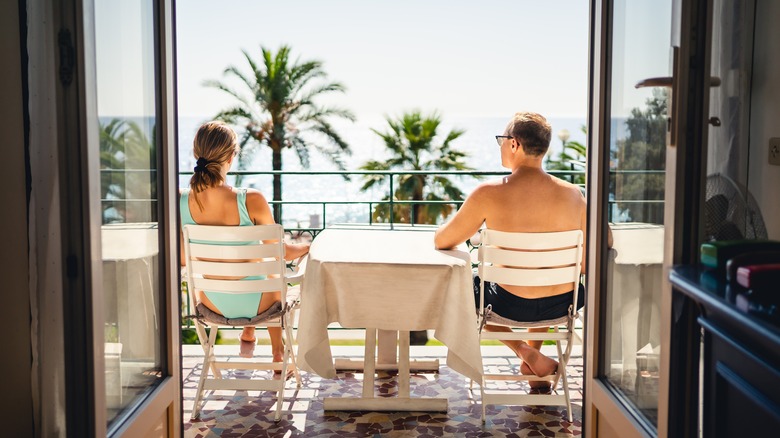Travel Agent Shares With Us Top Hacks To Try When Booking Your Hotel
Everyone has a hotel trick they swear by. Book on a Tuesday. Purchase after midnight. Only do a bundle. Never do a bundle. It's all a bit much to keep track of — and that's where an expert can help. We spoke exclusively with Victoria Fricke, a travel agent and owner of Vic's Vacations, to get her best advice about how to score a great hotel room and get the best deals while clearing up a few myths along the way.
For starters, 99% of the time it's best to book with the hotel directly, at least when you're traveling domestically, she explains. First, it means that the details of your reservation will be relayed to the front desk exactly as you selected them. There's less of a chance that something will get lost in translation. It also ensures a more flexible cancellation policy, should you need to modify your plans. And, looking to the future, it doesn't hurt to start building points and status with a specific hotel group so you can score upgrades down the line.
On the other hand, on an international trip, it's not always necessary to book direct. About half of the time, you can save on your hotel room by booking through a supplier, says Fricke. "There, I can combine hotel, flights, transfers, and insurance at a bundled and discounted rate. This gives a cancel-for-any-reason insurance policy with the full ability to cancel or modify reservations up until the day of travel and oftentimes a discount of $300 or more per reservation."
When to reserve a hotel room
Contrary to popular belief, there is no best day of the week to book a hotel room, says Fricke. Live inventory fluctuates based on supply and demand. On a Monday, for example, the price of a hotel room for the weekend could be $129 for a beautiful hotel by the beach. By Wednesday, you could see that price jump to $149 as people lock in their plans, especially if the weather forecast looks nice. The higher the demand for a room, the higher the price will be.
Weather is just one cause of price changes. The rates can dip or spike depending on local events, holidays, inflation, seasonality, and how popular the destination is, among other factors. With so much movement in the hotel market, the best way to lock in a good rate is to look as early as possible, says Fricke. Check on the price periodically to watch how it changes. "See if there's a promotion that might come along to make that price lower, and work with a travel advisor to help you identify if you're looking at a rate that's below normal, normal, or high," she explains.
Event fees and loyalty programs
If you're wondering about whether you should be upfront about special occasions, especially if you could end up paying a "wedding tax," it's best to work with a travel agent to snag the best deals, says Fricke. "I tend to save clients hundreds and the wedding couple thousands above what they would spend on their own without having their group noted as a wedding. There are certain perks that couples get for their weddings and a discounted rate I secure for all guests."
Then there's the age-old question of whether it's worth it to build loyalty points with pricier rooms or opt for the most economical option. The answer lies with your travel habits, like whether you're there for business or for pleasure, says Fricke. If you have status with a certain hotel for work-related stays, go ahead and stick with that brand to keep earning hotel rewards. If you're the type to only travel a couple of times a year, shop around and choose the lowest rate, she explains. "It never hurts to get a loyalty number and use it, though. Just being a member of a loyalty program at a low occupancy hotel could lead to an upgrade." We'll take that, any day.


